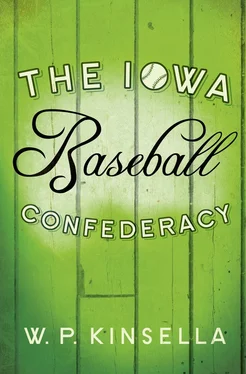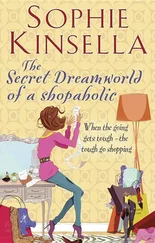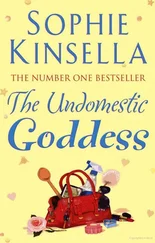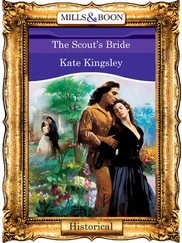‘Your experience with women hasn’t exactly been trouble free,’ I thought of saying, but again, didn’t.
‘Then I met this woman, Gid. And I think she was the start of this whole thing with the Confederacy.’
‘She’d slipped through one of the cracks in time,’ I said, staring out the window, resisting the temptation to say something about its being a wide crack.
‘I was just off State Street, I think. A dark street with sidewalks covered in grit and glass fragments. There were boarded-up buildings, and bars with blue neon beer bottles bleeding down their windows. She ambled out of a doorway, wide as she was tall, so ash-blond I swear she gave off light, an aura. She was as blond as you. She had bangs to the middle of her forehead. The rest of her hair was straight and chopped, as if a bowl had been set on top of her head. She might have been twenty-five or she might have been fifty. Her face was wide and mottled, her nose flat as a baby’s. She was wearing a tentlike dress that stopped above her pale knees; the dress was a swirl of color, like scarves blowing in the wind.
‘Her eyes were a pale, pale blue, and she was barefoot. She walked splay-legged right into my path, her stubby feet with their gray, sluglike toes grinding sand. She’d come out of a run-down building where dirty velvet curtains were strung across a storefront. A few stars and triangles were painted on the glass in front of the curtains. The words FORTUNE TELLING had been hand-lettered on the windowpane by an amateur.
‘That woman looked a little bit like Missy, you know, except she was a lot fatter than Missy, and she wasn’t a … a mongoloid, although before she spoke I thought she might be. As I stood staring at her, the only thing I could think of was a white Gypsy, an albino Gypsy.
‘‘‘Excuse me,” I said, and tried to step around her. But she didn’t move; in fact, she leaned into my path until I had to stop.
‘‘‘No, no,” she crooned, like she was talking to a child. And she put her pudgy hand on my arm. Her fingers were white as fresh fish, the nails chewed down to the quick.
‘‘‘I came to meet you,” she said in that same purring voice. “I could feel you getting nearer.” Her bottom lip was turned down like that of a child about to cry. Her teeth were short, crooked, and stained.
‘‘‘Go home to Iowa,” she said. “You’re not supposed to be here . Go home.” I glanced down at her huge knees; they were dimpled and scarred.
‘‘‘What are you talking about?” I said. But she was gone. I swear it, Gid. Gone, vanished. There I was, standing on that sleazy sidewalk, lookin’ like a fool, talking to a parking meter, a big, prehistoric, beast-headed thing, all pitted and ugly and metal-smelling.
‘I got out of there, let me tell you. But I never forgot that woman or her voice. And she was right. Because I no sooner got back to Onamata than I dreamed your mother. And then went out and found her.’
Ah, yes, my mother. I think it better if I tell the story of how Matthew Clarke met his wife. I was raised on that story. My father told it to me for the final time on the way to Milwaukee the day he was killed. It is the first story I remember hearing from my father, and the last.
The events that disrupted my father’s life, and in turn mine, happened in the summer of 1943. Part of the story involves my father being hit by lightning.
On that sultry Iowa evening, storm clouds swept in from the west like a fleet of tall ships. Silver zippers of lightning decorated the evening sky, and a lightning bolt struck my father as he and Maudie, the strange girl he had just met, sought shelter from the storm. He wasn’t killed; he wasn’t even injured seriously; he wasn’t fried by the heat of the bolt, disfigured, or melted down like a record left in the back window of a car. He was, however, forever changed. For as a piece of stationery is squeezed between the jaws of an official seal or as liquid metal is struck into a shiny new coin, my father’s life was altered.
As well as gifting him with a wealth of information about a baseball league known as the Iowa Baseball Confederacy, the lightning tampered with my father’s blood, rearranged his chromosomes gently as a baby’s breath turns a mobile, rattled his bone marrow, disrupted his immune system. That is how he passed the Iowa Baseball Confederacy along to me. When I was born, two years after the lightning struck him, my little flower of a brain was crammed with the same statistics, the same league standings, the same batting averages, the same information that plagued my father. Yet my knowledge was veiled, covered by one of those layers of history my father was so anxious to expound on, hidden from my view like a dove cuddled beneath a magician’s handkerchief. Eventually the Confederacy came to me full-blown, one fateful day at County Stadium in Milwaukee, the day my father died. But that comes later.
After Matthew Clarke was struck by lightning, the nut of information that was the Iowa Baseball Confederacy began to grow like a summer pumpkin. The Confederacy crowded in on his life until it became like a fat man in an elevator with two huge suitcases.
To say that my father was regarded as an eccentric in those years after he became obsessed with the Confederacy would be mild understatement. Luckily, eccentrics were tolerated, even encouraged, in small Iowa towns. ‘Like father, like son,’ the people of Onamata say about me. ‘That Gideon Clarke is a right odd fellow,’ they say, ‘but he comes by it honestly.’ I think they whisper about me more than they did about my father because I don’t work steadily, a cardinal sin in America’s industrious heartland. Thanks to my mother and sister, I have more money than I will ever need.
But to the story. As I’ve explained, my father was carrying his graduate school application in his back pocket the dreamy August evening he felt compelled to travel to Iowa City and take in the Gollmar Bros. Carnival and American Way Shows. As he approached through the parking lot he could see that the carnival was a small, sorry operation: rusty, square-fendered trucks were mired in a confusion of mud and cables. Behind the trucks was a string of blunt-nosed buses with bulging tires, some with frayed curtains at their windows. Portable generators, which powered the frail carousel and the paint-freckled Ferris wheel, roared deafeningly.
As Matthew set out for Iowa City that day he’d had the feeling that there were presences all about him, that there was hidden life in the poplar leaves that fluttered alluringly in the yard; he’d turned back toward the house once, as if beckoned by the group of slim hollyhocks that stood under the bedroom window at the side of the building. For a few seconds Matthew had thought he could hear them humming to a mysterious military music. The hollyhocks were surrounded by cosmos, themselves tall. The pale pink, wine, and mauve cosmos, peering from the frilly green lace that was their leaves, looked like delicate children appealing to a parent. Matthew stood absolutely still for several moments, staring at the tableau, waiting expectantly. There was something about the flowers; he had the feeling they wanted to speak to him.
During the drive to Iowa City, Matthew had thought he’d seen an Indian walking in the ditch, loping along with enormous strides, an Indian wearing only a breech-cloth. But as he came abreast of the spot he’d seen that it was just a trick played by the sun as it slanted through the emerald cornstalks.
Matthew slouched down the midway, his hands deep in his pockets, his dark eyes, though downcast, taking in everything. He stared and stared at the rides and the booths. He spent no money. The trampled and muddy grasses of the fairgrounds were frosted with cedar shavings, and their perfume filled the air. Matthew craned his neck, brushed stubborn curls from his forehead, stopped and scrutinized a brightly lit booth where a pyramid of milk bottles repelled puffy baseballs, until he was certain the booth held nothing of significance.
Читать дальше












